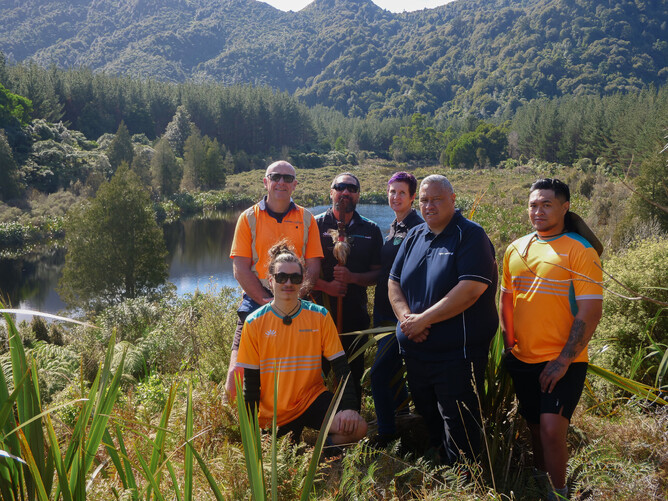A karakia, echoing through the Kaimai ranges, marked the first day of a “lifetime” partnership between iwi-led te taiao (environment) restoration group Wairere Mahi and Rayonier Matariki Forests.
Initially, this partnership is focused on pest control and rākau (tree) planting in a 7-hectare area surrounding Killarney Lakes, which is a small portion of the 723.5-hectare block of Ngāti Hinerangi land leased by Rayonier Matariki Forests for pine forestry.
Rayonier Matariki Forests Bay of Plenty Forest Manager, Rob Schoonderwoerd, says this partnership is about kaitiakitanga (guardianship) and whanaungatanga (connection).
“It’s not just about getting rid of pests or growing more native trees. For us, this is a lifetime partnership with Ngāti Hinerangi. Ultimately, we’re all only here for a short time and we want to leave the land better than we found it”.
To kick-start the initial two-year investment, three Wairere Mahi kaimahi (workers) placed tracking tunnels to identify what pest animal species are present. Later this month, audio monitors will be placed to ascertain what taonga (special) species of birds and bats are present.
Tim Aoake, Wairere Mahi General Manager, says this mahi (work) is intergenerational.
“Our tūpuna (ancestors) are shining down on us right now. They’re happy we’re back on the whenua and being kaitiaki (guardians) for our whānau. We want to bring our tamariki (children) out here, we want them to know the historical value and learn the history and importance of our whenua (land)”.
Manaaki Kaimai Mamaku Trust (MKMT) manages the Kaimai Mamaku Restoration Project (KMRP) - a landscape scale restoration project that brings together all stakeholders, agencies and iwi-hapū working to restore the mauri of the rohe.
This business investment is the first of its kind in the Kaimai Mamaku.
“This is a really momentous day,” says MKMT CEO Louise Saunders.
“It’s a trail-blazing partnership. We will take the learnings from this and fast-track more of the same across the rohe (area). The goal is for all iwi and hapū around the Kaimai Mamaku to have this opportunity on their whenua”.
This investment has come at an opportune time, with many pest control projects around Aotearoa having to close down with the conclusion of the majority of Jobs for Nature funding. There has been significant investment in training and upskilling for all KMRP kaimahi,and Louise says it would be devastating to see this end.
“Neither government or councils can fully fund the restoration needed to reverse biodiversity loss and strengthen ecosystems against climate change. But the cost shouldn’t fall to the philanthropy sector or already-stretched communities.
“The funding model needs to be completely re-thought. And it’s great that Rayonier Matariki Forests wants to be part of the solution,” she says.
During the karakia and whanaungatanga to officially launch the partnership, Wairere Mahi kaimahi Wiremu Johnstone shared his heart-felt appreciation.
"I'm honoured,” he says, “My cup is full. I hope to do this for my whole life".
L-R: Rayonier Matariki Forests Bay of Plenty Forest Manager, Rob Schoonderwoerd, Wairere Mahi Project Manager Mohi Korohina, Manaaki Kaimai Mamaku Trust CEO Louise Saunders, Wairere Mahi General Manager Tim Aoake, Wairere Mahi kaimahi Henry Burton and Wiremu Johnstone (front).


